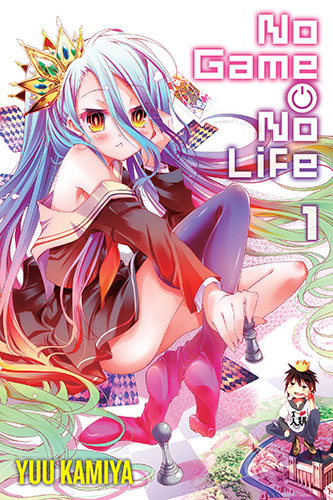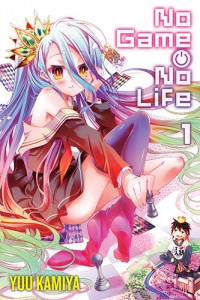By Yuu Kamiya. Released in Japan by Media Factory. Released in North America by Yen On.
I can only imagine that being someone who wants to read No Game No Life for the plotting, characterization, worldbuilding and excellent sense of dialogue is sort of like being someone who genuinely does read Playboy only for the articles. There’s that realization that you’re sort of enjoying something except for that one thing, but that you can’t actually tell people about it or recommend it to anyone, and it’s intensely frustrating. This is particularly the case with NGNL because the fanservice is so… unimportant. Yes, having Sora be a bit of a loser pervert allows Stephanie to feel conflicted so that she doesn’t simply give in and start crushing on him right away, but as for Shiro… there’s just no need for naked 11-year-old bath fanservice here.
Luckily, in prose format, this is a bit easier to gloss over. Ignoring the art (provided, unusually, by the author, who got his start as an artist for light novels, which perhaps also explains a lot of the service), I’m still really drawn into this world and these two broken losers who are brought into it. I had reviewed Seven Seas’ manga adaptation a while back, which covers about the first third of the book, and it applies here as well. Sora and Shiro have glorious overconfidence that’s really a mask for their crippling social issues, which can only be resolved when they aren’t separated from each other. This even extends to relationships, as Sora, while he does say “fall in love with me” to Stephanie (before, I think, he really grasps how things work here), points out straight away that nothing can happen for the next seven years as he literally can’t have Shiro not in the room so is waiting till she’s 18.
Much of the second half of the book is devoted to a chess match which has an excellent premise – the pieces move based on your determination, and won’t sacrifice themselves if they don’t want to. This is disastrous for genuine logical minds like Shiro’s who see every scenario provided the rules are correct, but Sora is familiar enough with warfare and dynamic speaking (seriously, Sora’s speeches are amazing in this novel… love the JoJo’s reference) to get the whole board on his side. It’s a great way of showing how [ ] works as a team. Likewise, I loved their discussion with Tet at the end, where it’s revealed he’d never lost before he met them, and they point out they’ve both lost many, many times… to each other. They know how to use that feeling to win again.
There’s a lot left unspoken here that I want to read more volumes to find out about. Actually seeing some of the other races, whether Sora or Shiro will actually bother to rule or just push everything onto Stephanie, whether Stephanie actually does have feelings for Sora or if it’s just the mechanics of that world at work… I’m likely going to read on, because of a keenly developed ability over years of reading questionable material to put my fingers in my ears and say la-la-la. But sadly, in the end this is another series, even in novel form, I can only recommend to the ‘otaku’ demographic it’s going after. And honestly, I suspect most of those people will be screaming ‘boycott, deal breaker!’ because she’s spelled Chlammy anyway.

